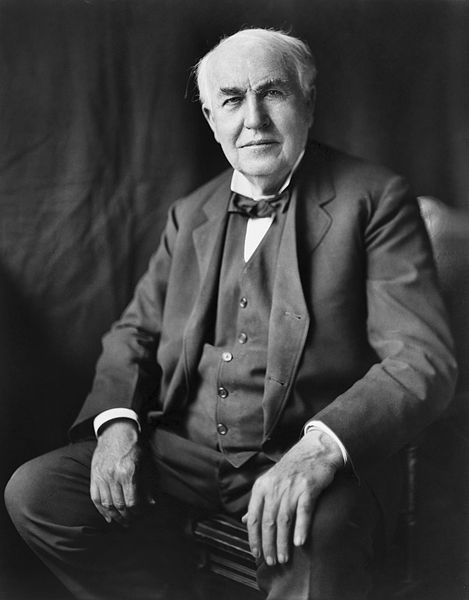*Image Credit: Wikimedia Commons In the quiet of his West Orange, New Jersey home, Thomas Edison — perhaps the world’s greatest inventor — died on October 18, 1931. Known as the “Wizard of Menlo Park,” many of his creations led to revolutions in the way the world lives, works and plays. With nearly 1,100 patents to his name in the United States alone, Edison turned his natural curiosity into a wildly successful idea factory. Born in Milan, Ohio in 1847, Edison spent much of his youth in Michigan. Prone to daydreaming and flights of fancy, especially after his hearing was affected by an illness, he frustrated teachers. In his teens, he found ways to earn money by selling snacks and newspapers to passengers on trains. Filling his free time with experiments, he developed an aptitude for chemistry by the time he entered his twenties. Moving to New Jersey, Edison took the idea of inventing more seriously as he settled in Menlo Park. He began my modifying existing technology to make it more efficient, using his experience as a telegraph operator to ease the challenge of keeping up with incoming messages. He shot to fame in 1877 with the invention of the phonograph, the first device to both record and play sound. Demonstrating the machine by playing a track of “Mary Had a Little Lamb” he had made himself, Edison astounded the public. Before long, he debuted an early improvement on the telephone, a concept that would turn into the electric railways common in public transportation, an iron ore separator which ended up making cement more durable by accident and, perhaps most important of all, affordable incandescent bulbs and electric lighting. Though prolific when it came to ideas, much of his role amounted to that of a manager or director. Believing he could speed up the process of innovation by forming teams of engineers, his offices in Menlo Park had inadvertently become the world’s first research and development lab. Within ten years, the building had grown to two full city blocks in size to accommodate the wide range of experiments being conducted. The list of Edison’s accomplishments is extensive: the first lit city block (demonstrated in New York City on New Year’s Eve 1879), a mass-produced electric light bulb, power grids, a stock ticker, the first motion picture, even an early form of the fluoroscope still used in medical diagnosis today. Among the several companies he founded to capitalize on his inventions, the utility provider Con Edison and the conglomerate General Electric are still in business. Working on projects right up until his death on October 18, 1931, Edison received a host of toasts and awards. Organizations as diverse as the French government, United States Navy and American Institute of Electrical Engineers paid tribute to him during his lifetime. To honor his achievements, in 1983 the United States Congress named his birthday, February 11th, National Inventor’s Day. Also On This Day: 1386 – The University of Heidelberg opens 1851 – Moby-Dick is first published as The Whale in London 1860 – France, Britain, Russia and the United States impose unbalanced conditions on China with the Treaty of Tientsin to end the Second Opium War 1922 – The BBC is founded 1954 – The world’s first transistor radio is announced by Texas Instruments
October 18 1931 CE – Inventor Thomas Edison Dies
*Image Credit: Wikimedia Commons In the quiet of his West Orange, New Jersey home, Thomas Edison — perhaps the world’s greatest inventor — died on October 18, 1931. Known as…
515
